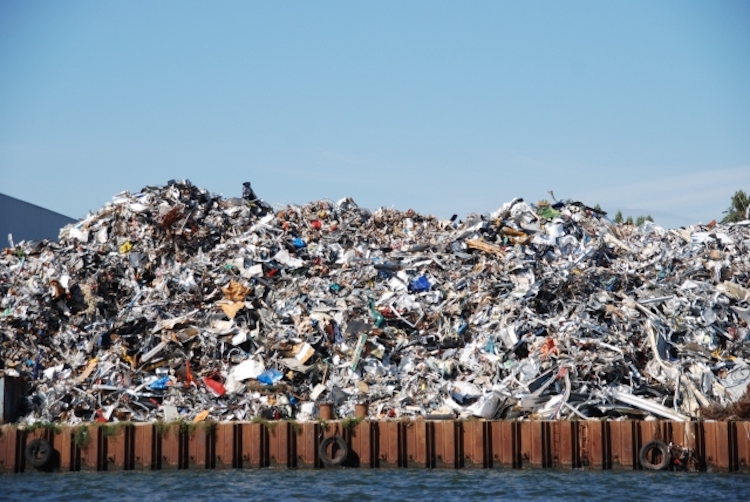By Jaya Ramachandran
VIENNA | QUITO (IDN) – Waste electrical and electronic equipment (WEEE), comprising old computers, televisions, fridges, mobile phones, and other appliances, also known as e-waste, is expected to reach 52.2 million metric tons by 2021.
It is equivalent to the weight of more than 29 million passenger cars, and would suffice to build 1,000 Eiffel towers, according to the United Nations Industrial Development Organization (UNIDO).
Electrical and electronic devices contain highly toxic and even carcinogenic substances known as persistent organic pollutants (POPs), which are chemicals that remain intact in the environment for long periods, become widely distributed geographically, accumulate in the fatty tissue of living organisms and are toxic to humans and wildlife. POPs circulate globally and can cause damage wherever they travel.
The proper disposal and recycling of the e-waste therefore needs to be addressed, not only because of the environmental and health challenges, but also because of the economic opportunities.
E-waste contains high value resources, precious metals such as gold, silver, palladium and platinum, as well as high value plastics that make resource recovery and recycling activities attractive from an economic and business perspective.
The total value of all raw materials present in e-waste in 2016 was estimated at approximately 55 billion Euros – more than the Gross Domestic Product of most countries in the world.
A global treaty, called the Stockholm Convention, seeks to protect human health and the environment from POPs. More than 152 countries have ratified the Convention and it entered into force on May 17, 2004. In implementing the Convention, Governments will take measures to eliminate or reduce the release of POPs into the environment.
In cooperation with the Ministry of Environment of Ecuador and with financial support from the Global Environment Facility (GEF), UNIDO has launched a programme involving 13 countries in Latin America to address interregional challenges with a circular economy approach to the proper recycling and disposal of e-waste.
Although there are many conceptions of the circular economy, they all describe a new way of creating value, and ultimately prosperity, through extending product lifespan and relocating waste from the end of the supply chain to the beginning – in effect, using resources more efficiently by using them more than once.
By and large, today’s manufacturing takes raw materials from the environment and turns them into new products, which are then discarded into the environment.
To sustain the recycling system, taking all stakeholders and stages of the e-waste recycling chain into account, UNIDO has been advising governments since 2008 on legal frameworks and identifying financial options. UNIDO’s e-waste programme has been implemented in countries such as Uganda, Ethiopia, Viet Nam and Cambodia using funds from GEF and partnering with companies such as Dell and Microsoft.
The new project, called ‘Strengthening of National Initiatives and Enhancement of Regional Cooperation for the Environmentally Sound Management of POPs in Waste of Electrical or Electronic Equipment (WEEE) in Latin American Countries‘, will be implemented in Argentina, Bolivia, Chile, Costa Rica, Ecuador, El Salvador, Guatemala, Honduras, Nicaragua, Panama, Peru, Uruguay and Venezuela.
During the opening session on March 20, Klaus Tyrkko, UNIDO’s Chief of the Stockholm Convention Division, highlighted the importance of the regional approach. “We are happy to support inclusive and sustainable industrial development in all our Member States, but it is also important to find coherence among policies for regional trade and business to thrive. This project aims to create a community of experts and institutions who can support each other while working in the national context,” he said.
The project, says UNIDO, will assist the 13 participating countries both technically and financially, as well as raise awareness and provide advice on policies, business, legislation and technology.
At the national level, it will help strengthen policies and train technicians and public officials, and develop information and raise awareness. At the regional level, it will work towards harmonizing key aspects of e-waste policies, and strengthening regional cooperation, knowledge management and information-exchange systems.
Jorge Jurado, Undersecretary of Environmental Quality of the Ministry of Environment of Ecuador, said: “In order to face the threat posed by the increase in the amount of electronic waste, it is necessary to set in motion all the mechanisms for its proper management, not only at the management level, but also considering the importance of drastically reducing its production.” [IDN-InDepthNews – 24 March 2018]
Photo credit: UNIDO.
IDN is flagship agency of the International Press Syndicate.
facebook.com/IDN.GoingDeeper – twitter.com/InDepthNews

